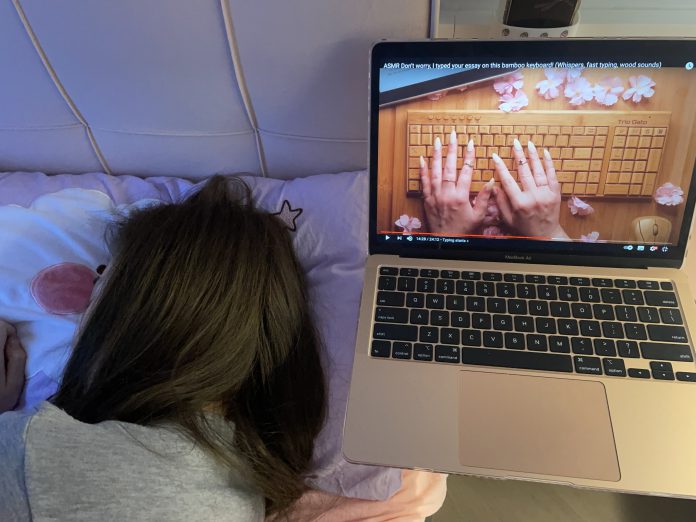People suffering from sleeping problems listen to ASMR to help them fall asleep.
By Gloria Chan Yi Lam
Tsui Lai-ying has been suffering from sleeping problems since last year. She has developed a habit of listening to autonomous sensory meridian response (ASMR) videos to help her fall asleep.
“When I fall asleep late, I feel tired the next day. I don’t know why I cannot fall asleep. Then I sleep late and feel tired the next day. I am trapped in this vicious cycle,” Tsui sighs.
Tsui was introduced by her friend to ASMR videos last year. She now listens to ASMR videos every night. She sometimes listens to ASMR on the bus to help her relax.
According to Psychology Today, “those who experience ASMR say that the sensation is triggered by soft noises, such as a whispering voice, or repetitive visuals, like towels being folded – essentially an array of seemingly ordinary sights and sounds.”
“I did not expect listening to ASMR videos could help me (fall asleep),” the 23-year-old says. She used to rely on steaming eye patches when going to bed.
Even though Tsui likes listening to ASMR videos, she is not attracted to all kinds of sounds. She finds crackling sounds of opening food packages irritating. She prefers listening to sounds of nature and whispering. Tsui also likes ASMR videos produced by a Hong Kong Youtuber, RUBYHEHAHA, who uploads clips of whispers.

Youtuber Hung Man-chong, has been posting ASMR videos on her YouTube channel under the name RUBYHEHAHA since February 2020. She has more than 2,880 subscribers.
“I found out that no one in Hong Kong was producing ASMR videos. I would like to produce these videos specifically designed for Hongkongers,” Hung, who produces videos of her whispering in Cantonese, says.
Hung is a sales assistant. She produces ASMR videos amateurly. She uploads videos when she has free time.
The most-viewed video in which she whispers while doing a role-play of an ear wax cleaner gains around 38,000 views.
“My viewers tell me they feel relieved and their emotions become stable after watching my videos,” Hung says. “Many commented on my videos saying that they would like to go to sleep after listening to my voice,” she adds.
“Whenever they are stressed and depressed, especially when having exams, arguments, or even break-ups, they feel relaxed after watching my ASMR videos. They fall asleep easily afterward,” Hung says.
She feels happy and motivated when people share their positive experiences after listening to her ASMR videos.

Jennifer Tang, principal trainer of Sound Therapy Hong Kong says that brain waves speed up when one is awake, while sounds of ASMR slow down human brain waves.
She explains that sounds can be put into two main categories. The first kind is single and repetitive sounds, like rubbing papers and combing hair. Another kind is slow and deep sounds, like human whispering.
“These sounds are proven to be slowing down brain waves, which generates relaxation,” Tang says. “Brain waves are slowed down, which is a physical reaction (prompted by listening to ASMR). This helps people fall asleep,” Tang says.
However, Tang reminds people who listen to ASMR videos to be mindful, especially those who often listen to whispering.
“Videos featuring whispering sounds convey messages. Users have to beware of the content that may affect their mindset negatively,” Tang says.
“The content of ASMR videos is designed by content providers (who are not professionals in curing insomnia). They are not structured,” she adds.
She also reminds users that listening to ASMR can only help them fall asleep. But users should not take it as official therapy for curing insomnia.
Tang agrees that compared with other sleeping therapies, ASMR in Hong Kong still lacks research. “If you would like to upgrade your quality of life, feel happier and healthier in your daily life, the first step is sleeping well.”
“If you would like to upgrade your quality of life, feel happier and healthier in your daily life, the first step is sleeping well.”
“We (members of Sound Therapy Hong Kong) witness a lot of cases who have been suffering from insomnia for 10 to 20 years. Sleeping problems can lead to physical illness,” Tang says.
Edited by Sarah Ryou
Sub-edited by Savoki Zhang







































